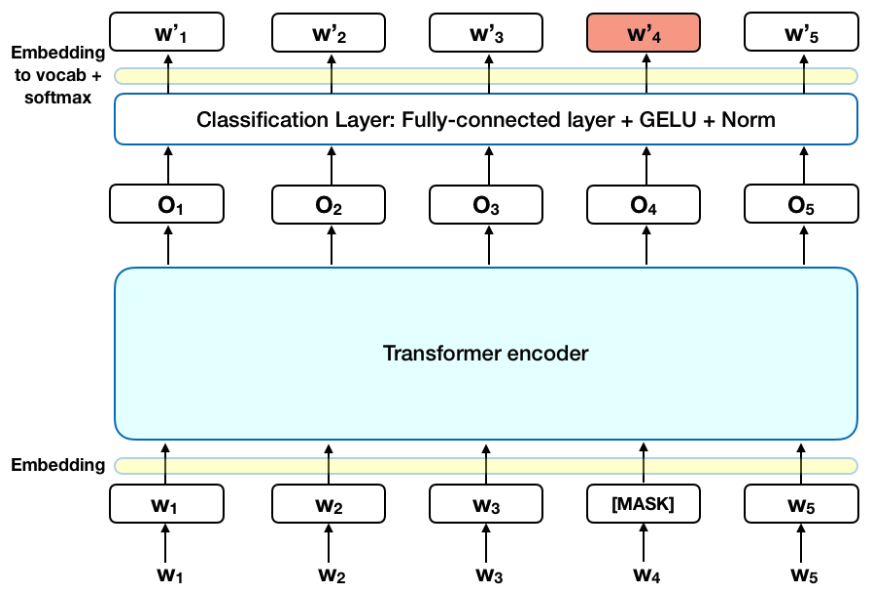BERT for Chinese Named Entity Recognition(bert4ner) Model
中文实体识别模型
bert4ner-base-chinese evaluate PEOPLE(人民日报) test data:
The overall performance of BERT on people test:
| Accuracy | Recall | F1 | |
|---|---|---|---|
| BertSoftmax | 0.9425 | 0.9627 | 0.9525 |
在PEOPLE的测试集上达到接近SOTA水平。
BertSoftmax的网络结构(原生BERT):
Usage
本项目开源在实体识别项目:nerpy,可支持bert4ner模型,通过如下命令调用:
>>> from nerpy import NERModel
>>> model = NERModel("bert", "shibing624/bert4ner-base-chinese")
>>> predictions, raw_outputs, entities = model.predict(["常建良,男,1963年出生,工科学士,高级工程师"], split_on_space=False)
entities: [('常建良', 'PER'), ('1963年', 'TIME')]
模型文件组成:
bert4ner-base-chinese
├── config.json
├── model_args.json
├── pytorch_model.bin
├── special_tokens_map.json
├── tokenizer_config.json
└── vocab.txt
Usage (HuggingFace Transformers)
Without nerpy, you can use the model like this:
First, you pass your input through the transformer model, then you have to apply the bio tag to get the entity words.
Install package:
pip install transformers seqeval
import os
import torch
from transformers import AutoTokenizer, AutoModelForTokenClassification
from seqeval.metrics.sequence_labeling import get_entities
os.environ["KMP_DUPLICATE_LIB_OK"] = "TRUE"
# Load model from HuggingFace Hub
tokenizer = AutoTokenizer.from_pretrained("shibing624/bert4ner-base-chinese")
model = AutoModelForTokenClassification.from_pretrained("shibing624/bert4ner-base-chinese")
label_list = ['I-ORG', 'B-LOC', 'O', 'B-ORG', 'I-LOC', 'I-PER', 'B-TIME', 'I-TIME', 'B-PER']
sentence = "王宏伟来自北京,是个警察,喜欢去王府井游玩儿。"
def get_entity(sentence):
tokens = tokenizer.tokenize(sentence)
inputs = tokenizer.encode(sentence, return_tensors="pt")
with torch.no_grad():
outputs = model(inputs).logits
predictions = torch.argmax(outputs, dim=2)
char_tags = [(token, label_list[prediction]) for token, prediction in zip(tokens, predictions[0].numpy())][1:-1]
print(sentence)
print(char_tags)
pred_labels = [i[1] for i in char_tags]
entities = []
line_entities = get_entities(pred_labels)
for i in line_entities:
word = sentence[i[1]: i[2] + 1]
entity_type = i[0]
entities.append((word, entity_type))
print("Sentence entity:")
print(entities)
get_entity(sentence)
output:
王宏伟来自北京,是个警察,喜欢去王府井游玩儿。
[('王', 'B-PER'), ('宏', 'I-PER'), ('伟', 'I-PER'), ('来', 'O'), ('自', 'O'), ('北', 'B-LOC'), ('京', 'I-LOC'), (',', 'O'), ('是', 'O'), ('个', 'O'), ('警', 'O'), ('察', 'O'), (',', 'O'), ('喜', 'O'), ('欢', 'O'), ('去', 'O'), ('王', 'B-LOC'), ('府', 'I-LOC'), ('井', 'I-LOC'), ('游', 'O'), ('玩', 'O'), ('儿', 'O'), ('。', 'O')]
Sentence entity:
[('王宏伟', 'PER'), ('北京', 'LOC'), ('王府井', 'LOC')]
训练数据集
中文实体识别数据集
| 数据集 | 语料 | 下载链接 | 文件大小 |
|---|---|---|---|
CNER中文实体识别数据集 |
CNER(12万字) | CNER github | 1.1MB |
PEOPLE中文实体识别数据集 |
人民日报数据集(200万字) | PEOPLE github | 12.8MB |
CNER中文实体识别数据集,数据格式:
美 B-LOC
国 I-LOC
的 O
华 B-PER
莱 I-PER
士 I-PER
我 O
跟 O
他 O
如果需要训练bert4ner,请参考https://github.com/shibing624/nerpy/tree/main/examples
Citation
@software{nerpy,
author = {Xu Ming},
title = {nerpy: Named Entity Recognition toolkit},
year = {2022},
url = {https://github.com/shibing624/nerpy},
}
- Downloads last month
- 313
This model does not have enough activity to be deployed to Inference API (serverless) yet. Increase its social
visibility and check back later, or deploy to Inference Endpoints (dedicated)
instead.
